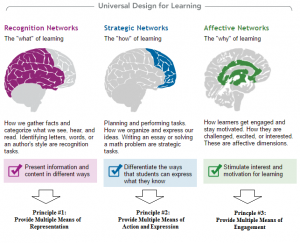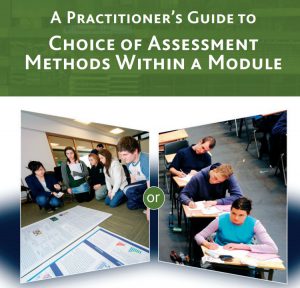What is it?
Students are often given ‘choice’ at the module level of a list of questions for exams and essays/reports or topics/projects. A flexible approach to assessment allows students to for example choose the best of several attempts at a task for summative assessments. Assessment choice takes this further. Using principles of Universal Design, students are presented with a choice of two or more assessment methods that allow them to demonstrate module learning outcomes.
Why would I use it?
Assessment for ALL: Waterford and West (2006) distinguish between three approaches to inclusive assessment practices:
- contingent approach (“special arrangements” such as extra time, transcriber, own room, etc.);
- alternative approach (e.g., a viva voce instead of a written assignment) offering a repertoire of assessments embedded into course design as present and future possibilities for a minority of disabled students;
- inclusive approach (e.g., a flexible range of assessment modes made available to all) capable of assessing the same learning outcomes in different ways.
This is depicted in the picture:

Assessment choice is an example of designing assessment approaches to cater for all students rather than having to make special arrangements etc for students with Specific Learning Differences. This is based on principles of Universal Design:

Using Universal Design may reduce the needs for alternative assessment arrangements (PAA at King’s) that come into play when a course only uses only traditional assessments which disadvantage some students (Francis, 2008). It has the potential to reduce Mitigating Circumstances Forms (MCFs) in cases where students see one assessment as stressful or requiring extra time. This can reduce the time-consuming admin burden for teachers and professional services staff, as well reduce the number of students seeking college services.
- Giving students a choice can help them become more assessment literate and take responsibility for their own learning by facilitating metacognitive awareness of their strengths and weaknesses (O’Neill and Galvin, 2010).
- Social justice (McArthur, 2016)- disciplinary knowledge and practices are not neutral but are created and sustained by socio-cultural norms. A supposedly neutral application of such practices can lead to unequal outcomes. Widening access to higher education must be accompanied by a questioning of practices which favour certain skills and personality types, abilities and ethnicities over others. “Access without support is not opportunity” (Tinto, 2008)
- When negotiated assessment is part of a student-centred approach, students are more likely to be genuinely engaged when they have chosen their own assessment and preferable helped to co-design it (O’Neill and Galvin, 2010).
Known issues
- Offering choice or flexible assessment should still allow students to meet the learning outcomes of the module or programme. Choices should be LIMITED in order to avoid inadvertently increasing stress when students are faced with a high-stakes choice (O’Neil et al, 2010).
- Students may not be in a position to understand their own strengths and weaknesses and therefore may make poor choices or low-risk choices. Similarly, if students have never seen or done a particular assessment, they may shy away from it. Consider the possibility that choice may disempower some students who do not have access to the same resources!
(Callender and Dougherty, 2018)
- Students may limit their choices to a restricted range of abilities that they are familiar with rather than trying to stretch themselves. A deficit model where, for example, students who may have normal human responses to stress of public speaking can opt out of this activity should be avoided.
- It might not be possible or desirable on courses where external accreditation requires a particular type of assessment/exam/lab work such as Law or Medicine or MoD courses. Always consider whether something is core or peripheral and whether universal design principles can be applied.
How has it been used?
- University College Dublin is a pioneer in the use of modular assessment choice. This resource is a comprehensive guide to designing and implementing such an approach, including case studies from Pharmacology, Human rights Law, Computer Science, Medicine, Radiography and Languages.

- Here are some videos from Trinity College Dublin with lecturers talking about their modules.
